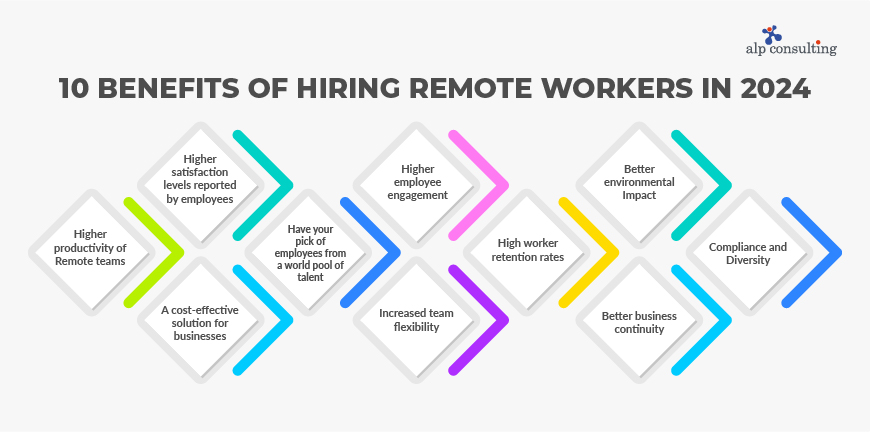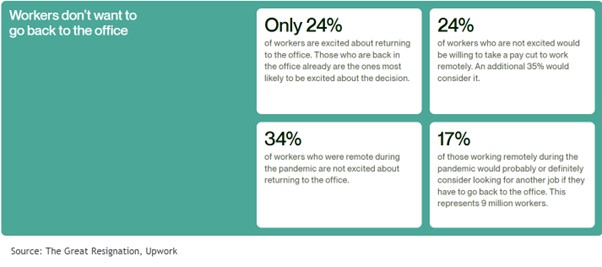
How to Manage High Payroll Complexity?
09/07/2024
8 Benefits of Using Zoho CRM for Your Business
11/07/2024- 1. Higher productivity of Remote teams
- 2. Higher satisfaction levels reported by employees
- 3. A cost-effective solution for businesses
- 4. Have your pick of employees from a world pool of talent
- 5. Higher employee engagement
- 6. Increased team flexibility
- 7. High worker retention rates
- 8. Better environmental Impact
- 9. Better business continuity
- 10. Compliance and Diversity
Its 2024, and we are somehow still reeling in the pandemic experience, although, it’s been 3 years since we passed that phase. The world of work has changed drastically since then, but more specifically, it has changed the outlook of how individuals perceive their work lifestyles and in light of the same many have taken to remote work and seem to be doing quite well. And while businesses seem to be thriving and have reaped major benefits of hiring remote workers, the rewards certainly haven’t been one-sided, given the wholesome experience of the hired remote employees as well.
We’re saying 10 in our title, but of course, there are way more benefits of hiring remote workers in India. Some of the key benefits are-

1. Higher productivity of Remote teams
For years, or to honestly say, even today, most companies believe that working remotely lessens the productivity of workers and while this may hit right to most of you, as somewhere, we are all stuck in the old school of thought, recent studies have shown otherwise. A remote trends study by Upwork found that 61% of remote workers claimed that their productivity was much higher since they started remote work as opposed to when they worked in office.
Even the hiring managers agreed. Despite the chaotic shift to remote work, thing actually seemed to be working out for the better eventually.
And it isn’t only this one study that said so, as it was consistent with two other findings, that reported higher work productivity.
Reasons that attributed to this higher work productivity by remote workers were found to be
Zero commute
Since the commute cut down to zero, workers have a better opportunity to facilitate a healthy work-life balance, as they can allow themselves time to catch up with their families, get some exercise done, resulting in lesser stress and more productivity.
Design a comfortable, yet productive work environment
Remote work gives the opportunity to workers to design a work schedule that best suits their time. For example,
- they can take breaks at a time they deem fit as opposed to the ones that must be taken while working in-office at particular times only.
- Flexibility to move around more, allowing a bit of exercise and movement that helps with brain stimulation resulting in better focus at work.
- A comfortable physical environment that is pleasant on the eyes and mind.
2. Higher satisfaction levels reported by employees
Naturally, when an individual is given the flexibility to work in an environment, they are comfortable with, satisfaction levels are a lot higher, as they are finally able to balance the life and work. The reasons for these elevated levels of satisfaction as per a study varied from-
- Being present for their family a lot more
- Lesser work life conflict
- Low levels of stress
- Feeling of being more trusted and appreciated
All of this resulted in significant improvement in some of the key business metrics:
- Higher retention rates
- More customer loyalty rates
- More profits
- Higher employee engagement
3. A cost-effective solution for businesses
Put simply, and clearly, remote teams mean, you technically do not provide them with any infrastructure required which is cost-effective for businesses. Some of the big guns of the industry such as IBM and Sun Microsystems saved around $50 million and $68 million in real estate infrastructure.
However, even on a small scale, as a startup or small-scale industry you will be saving costs. Here’s how.
What are some of the key savings that come to your mind when you think of cost savings
- Rent and other utilities
- Constant upkeep of an office space
- Tax saves on spaces
On a larger scale, some of the other ways you can benefit are
- Hire workers from outside of the state, where there is immense talent potential but are paid a lot lesser. Not only does this turn out to be cost-effective, but also a major source of talent
- To hire a remote worker is to engage them when required, and do not own the burden of paying them for full-time work.
- Can operate in an event of disaster
- Avoid relocation costs
4. Have your pick of employees from a world pool of talent
One of the biggest advantages of hiring remote workers is you are not bound to a certain geographic region. You have the freedom to pick and choose your employees from across the nation. And this is a boon, especially in today’s tight labour market where finding talent is a tedious feat.
When you hire a remote worker, you get to work with people from diverse backgrounds with unique experiences and talent that can be an excellent value add to your team and organization. Additionally, studies have shown the enormous benefits of DEI commitments.
5. Higher employee engagement
This one comes as a surprise. One might think that working in-office results in higher employee engagement, but on the contrary, remote teams seem to be more engaged as they are less stressed, have a better work-life balance. The enhanced emotional and mental health results in more innovative, enthusiastic and energetic behaviour.
Another important thing to consider is the element of trust. Employees like to feel trusted and when organizations instil this in them, they feel empowered and appreciated, and automatically results in higher engagement. However, according to a Gallup study, it was found that employees who worked remotely three to four times in a week were highly engaged and productive.
6. Increased team flexibility
Being agile and swift is one of the most important traits for a business to succeed. With the rapid advancement of technology, its integral for teams to keep up with the latest technology trends to meet customer demands effectively. Of course, while this can be done with your in-house team as well, there is a due advantage with remote teams.
Remote teams or freelancers are experts who can work at your disposal as and when you require them to. Additionally, freelance teams have individuals with distinct, unique talent who you can pick and choose from as well as scale up or down as per your business needs.
One example where this agility of teams worked was during the pandemic when Amway produced a global video series across five countries, in less time than using their traditional approach, and saved $100,000 to boot.
7. High worker retention rates
Since the pandemic, it’s been quite difficult to get workers come back to work full time in the office as the pandemic forced people to stay indoors and work remotely for way longer than expected. But surprisingly, this move didn’t harm the productivity rather enhanced it. However, a few companies, once the pandemic was over tried to enforce a full-time work from office model once again, and this hasn’t gone well.
A high percentage of employees said they would rather look for another job than return to office full time. About 24% of employees even agreed to receive lesser pay if allowed to work remotely.

With these stats it was quite evident that if companies didn’t opt to hire remote workers, not only would they be missing out on talent but would also hurt their employee retention rates.
8. Better environmental Impact
Protecting the environment is probably important than anything right now. Employees these days, look to work with companies that are responsible towards the environment. And remote workers happen to contribute positively to the environment without even trying too hard. Here’s how-
- Every 1% reduction in vehicles reduces road congestion by 3x.
- Nearly three billion gallons of gas are wasted in traffic jams, which accounts for 26 million extra tons of greenhouse gasses.
- Working remotely just part-time would save more than 1,600 lives, prevent almost 99,000 injuries, and save over $12 billion a year in direct and indirect costs associated with traffic accidents.
9. Better business continuity
Remote work arrangements can easily ensure the continuity of business operations, without interruption even during emergencies, such as natural disasters or pandemics for obvious reasons. Remote workers can work from the convenience of their home and make sure all business operations are run smoothly.
A distributed workforce mitigates risks associated with regional disruptions.
10. Compliance and Diversity
Remote work facilitates hiring a diverse workforce, promoting inclusivity and equality.
Companies can more easily comply with regional employment laws and regulations by hiring remote workers in various locations. Many businesses are taking the borderless talent pool a step further by hiring freelance team members in specific time zones to create a production cycle that follows the sun.
There are myriads of benefits that companies can leverage by embracing remote work. From improving their operations to enhancing employee satisfaction, the benefits of hiring remoter workers are so many. And to your advantage it seems like one of the best options for companies to stay competitive in an increasingly digital and globalised market.
Contact Us For Business Enquiry

Roshan Suresh
Roshan Suresh is the Vice President at ALP Consulting with over 17 years of experience in technology and leadership hiring. He specializes in full-time recruitment for IT products, e-commerce, services, and BFSI sectors, driving end-to-end hiring strategies for top enterprise clients. With a strong foundation in R&D and technical recruitment, Roshan has built high-performing teams that deliver exceptional talent solutions across India.




